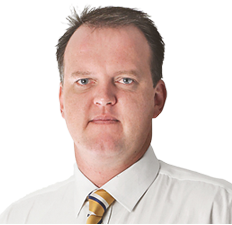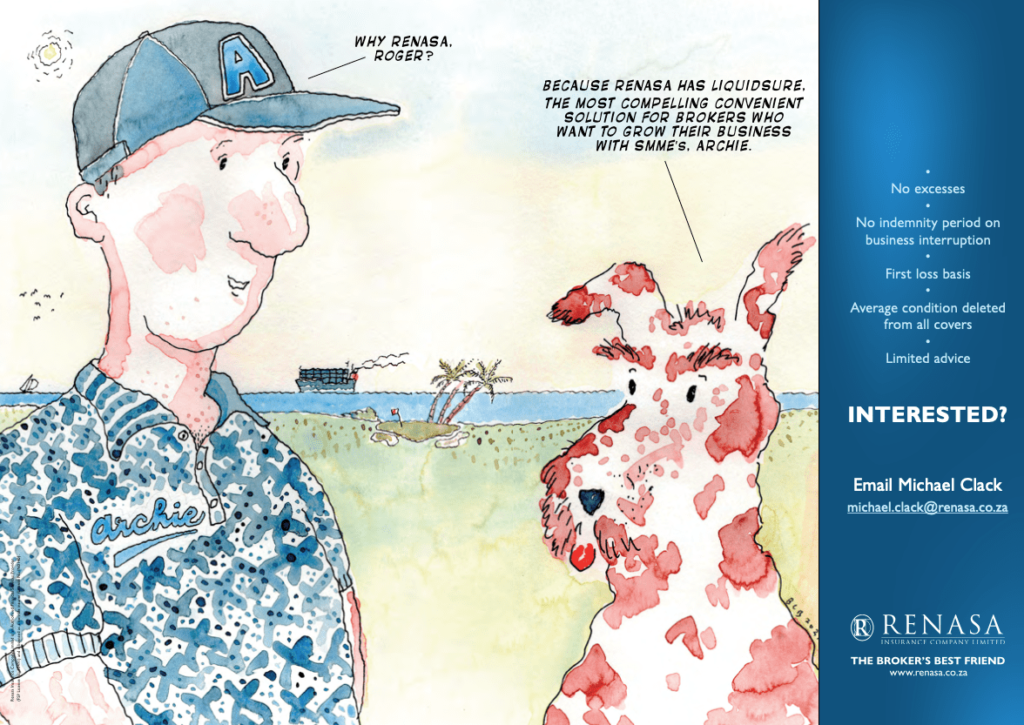Michael Clack, General Manager, Business Development at Renasa takes us through his views on what makes a strong broker-insurer relationship.

COVER: How do we get the most from broker-insurer relationships? Clearly, this relationship goes both ways, and both sides can benefit from it. Can you give us a couple of pointers, from your perspective, as a business development manager, what makes a good broker-insurer relationship?
Michael Clack: In my view, trust and credibility are probably the foundation of a good relationship. At Renasa we always say we are the brokers best friend, and I think those are just words unless you walk the talk. Availability and flexibility are key. As insurers, we need to adapt to the ever-changing insurance landscape in terms of product development, product design and compliance.
Trust and credibility, are things at the foundation that we need to work on. However, the big thing is managing the expectations. We need to understand each other’s businesses in order to align our objectives and have a purposeful relationship. A big thing that we strive to, is to always be there to assist our brokers with any query or problem. So, again, availability and flexibility are key.
Decision making is also a very important aspect of a good relationship, quick and in the brokers office. We have dedicated broker managers that make these calls every day in the brokers office. Then we try to keep our brokers independent. Brokers require that independence, so allowing the independence of the brokers to bind a policy or to pay a claim,etc, and just being there to assist them with those decision making processes, is always key.
To have that safety net, that you are there to assist. We would like to call it assisted independence. Empowering the brokers and giving them that sense of empowerment, are the key things that I think build a solid relationship
COVER: In insurance, a lot of stuff is repetitive and the same. But when you get to the anomalies, then a lot of the time there is no precedent, and you need somebody that you can have a discussion with. When it comes to the broker side of this relationship, the day-to-day operations, how can a broker create a good working relationship between the broker staff and the insurance decision makers?
Michael Clack: I think it’s a purposeful relationship, so we shouldn’t focus on one sided objectives. Brokers need to understand the business, understand what their objective is, and align themselves with that. I think it’s important for brokers’ staff to know what the roles are in the brokerage and what it is that the insurer expects.
This is achieved by regular communication, talking to each other, training in terms of product specific training, as well as sharing general Insurance knowledge. I think we say we have these experienced broker managers and experienced people in the business but I always say 40% of what we know in this business is what you learn from a book, more than probably 60% is about the experience. Because, although everything is the same, there is always those curveballs that seem to crop up and experience carries you through that.
So, sharing that experience with the brokers, and the brokers sharing their experiences, keeps everybody aligned. Somebody once told me that in this business, the more you know, the more you know you don’t know. There is not anybody that can say he knows everything about insurance. It’s always that, like you said, communicating, talking to each other, sharing experiences and various things like that. I think it’s also important that the people in the brokerage, the staff, have that accessibility to decision makers. It is very important.
This is one of the things that defines Renasa, that anybody, anytime, is available from Renasa to speak to a broker. That goes for a claims technician in a branch, right up to the CEO. The availability is there to share and to help to assist. Now, the important thing about the day-to-day running, is face time with brokers, being there, not in their face, but seeing them. Unfortunately, the pandemic has put a lot of restrictions on that, but there’s many ways that we can achieve that FaceTime, like what we do now on teams or zoom calls, to be there to make sure that everybody knows that you are available, and you’re there to be of assistance to the broker. I think the big thing, day to day, is again, the experienced broker managers that we have in those broker offices, it is a good thing for the brokers to know that we are there.
COVER: Now, when it comes to insurance, obviously, claims are inevitable. That is what the industry is here for. How does an insurer and a broker work together, from your experience, to ensure a healthy broker portfolio, because that is a large part of the relationship, keeping that portfolio healthy?
Michael Clack: That is a big part of our day and our world. I think the most important thing is that information is key. Information in terms of trends on what’s going on in the portfolio, and to share that with the brokers regularly. My mentor used to say to me, “agree on the numbers”, there is no point in me talking about 40% and the broker sitting on another number or another page, so we need to sit down with each other and have those discussions. We need to agree on the numbers to make sure that everybody’s on the same page and that we are all talking from the same book, so to speak. It goes for the growth trends and not only to claims necessarily, but everything to make sure that the portfolio is maintained and kept in a healthy state.
Again, it is the constant talking, communication. Especially in these times. We need to make sure that we are there to assist. I think that over the lockdown period, the trend has been to send emails, and you have these long discussions over emails, a lot of the time. Just pick up the phone and have a chat, you can sort out those issues very quickly. It is like we said earlier, insurance is like a living thing, we are not out there selling dishwashers, we are selling insurance.
Life for you is very different to me, so there is always these different needs, so we need to be nimble, we need to be flexible and sometimes think out of the box. Another important thing is to agree on measurables – how do we process a claim, how do we do these things – so that everybody knows. We give a lot of our brokers claims mandates, to settle claims quick and easy, and again, with that assisted independence, so they can make those decisions quickly, benefiting the client at the end of the day.
COVER: I think the better the communication, the easier it is to have difficult conversations. It is also easier to, as you say, be able to facilitate growth in the brokerages that way.
Michael Clack: Yes and, with that communication, people become familiar with each other. It is not always easy discussions that you have in this business, but at least having a solid relationship you can sit down and really give your side of the story and work on solution without people getting too emotional and so forth.
So, the relationship, in this business, is probably one of the key factors to a healthy broker-insurer relationships.


